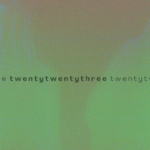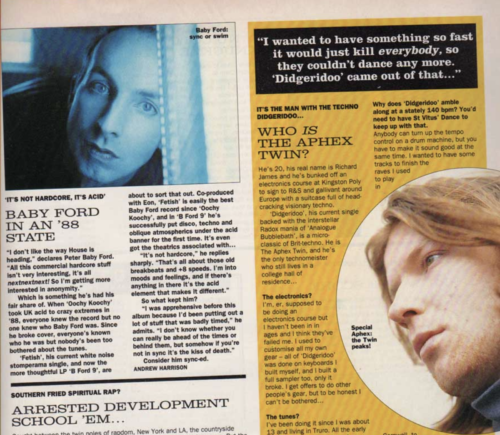
Comment: Rising tempos and the role of social media in electronic music
November 21, 2023
stratus audio: best of ’23
December 27, 2023“Discovering” an artist that you already know sounds like something a grandparent or an older aunt would fall victim to but it’s happened on a fair few occasions now - The result of listening to lots of Peter Ford.
Through an almost inconceivable number of aliases, both the quality and longevity of Ford’s career mean that you’ve probably come into contact with some of his work already.
Details about the man are relatively scarce, but as one of underground dance music's most influential figures, we thought it right to compile some rare archived material alongside some of our favourite cuts.
Poem for Wigan (1989) - Ooo the World of Baby Ford
Ford's first LP, Ford Trax, released anonymously in 1987, is credited as one of Acid House music's earliest works. Taken from his second album Ooo the World of Baby Ford which found far less commercial and critical success, Poem for Wigan is a nod to the Northern Soul scene, emergent in Ford’s younger years as a 14 year old boy in Bolton and a source of deep inspiration.
The track centres around a vocal sample, taken from an interview with a man heavily involved with the subculture.
It’s a topic that warrants a piece alone, both rooted in America’s midwest and inspired heavily by the works of predominantly African American artists, there’s more than material similarities between the two scenes. In the below clip taken from an 1992 interview with Kiss FM, back then a pirate radio show, Ford briefly delves into the shared cultural element.
BFord 9 (1992)
With popularity comes saturation. The Acid House scene, which Ford had played a role in shaping during the 80s, had become predictive and commercial by the early 1990s.
“I don’t like the way House is heading… all this commercial hardcore stuff isn’t very interesting it’s all nextnextnext!” Ford told Select Magazine in 1992.
It was a statement backed with new material. His third LP BFord 9 marked a shift sonically towards a driving techno sound.
Many have attributed the rise of ‘minimal techno’, a stripped back derivative of the classic Detroit style, to the likes of Daniel Bell and Robert Hood, but tracks like Blow Back show Ford as a figure at the fore of an emerging genre. Groove-centric music that isn’t reliant on excessive vocals or piano riffs.

Credit: Select Magazine
When asked about Techno influences, Perlon label co-founder Zip, a significant driving force in Berlin's minimal scene in the noughties, describes the impact BFord 9 had on him.
Speaking to Stephen Titnus in 2011 he recalls “shooting a video for Bigod 20 around L.A., the labels headquarter. I got that album (BFORD 9) out of the promotional cabinet of the label. It stayed in the CD player of our car for the rest of the trip. It changed something.”
Few tracks have aged better than Move On Alt mix, or “audio butter” as one youtube commenter calls it.
Minimal Man (1992 - 2009)
In 1992 Ford met Ian Loveday.
A pioneer of the British House scene in his own right, Ian’s creative partnership with Ford would last almost 20 years.
One fruit of collaboration was the creation of the legendary label Trelik, named after the Trellick building in West London, catnip for any brutalist architecture lover.
Trelik would play home to the pair's studio project Minimal Man, a moniker that produced some of the earliest examples of Minimal Techno.
'Ravier' releases like the 1993 Consexual are well worth a dig, as is pretty much anything released on Perlon, but with those classic 90s organ keys, fractured & strange vocal samples and a tempo fit for any peak time dance, the 1999 version of Chicken Store takes the biscuit.
Techno, Tech House or House? It’s really good regardless.

Trellik Tower, West London. Credit: Tim Winstanley
Soul Capsule - Overcome EP (1999)
Whether it’s the urgent sounds of Minimal Man, or the intricate layers with Zip as BFZ, collaboration has been a constant throughout Baby Ford’s career.
Whilst Ford spent the mid 90s doubling down on stripped back, albeit euphoric Minimal Techno with work like Headphoneasy Rider, the following decade would take a turn for groovy, deep and spacey soundscapes. With the A side's raw swing, and the emotion of Lady Sciene’s NYC mix, this record feels like a bridge between the two eras.
Built in (2003)
Loopy and luscious - what more needs to be said?
Baby Ford
Whether through his early minimal cuts or the consistently progressive A&R on label’s Trelik and Pal Sl, both of which are still active today, Baby Ford makes a case for one of the most underrated figures in underground electronic music. I’d encourage anyone to have a deep dig through his discography, it’s simply a treasure trove of quality that stretches right back to the very foundations of the scene in the UK.
With it’s thunderous 4/4, urgent synth work but euphoric progression in the latter half, Slow Hand is a track that could sit on any of Ford’s many labels and probably feels like a nice way to end this love letter.


